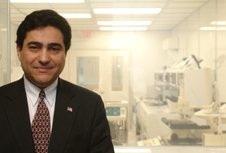Aug 25 2009
Northeastern University's Nanoscale Science and Engineering Research Center for High-rate Nanomanufacturing (CHN) has received a $12.25 million renewal grant from the National Science Foundation to continue its industry-leading research: translating nanoscale scientific processes into commercially viable technologies.
 Center director Ahmed Busnaina. Photo by Craig Bailey.
Center director Ahmed Busnaina. Photo by Craig Bailey.
The center's three academic partners - Northeastern, the University of Massachusetts Lowell and the University of New Hampshire - are conducting cutting-edge research that has the potential to revolutionize the manufacturing of smaller, more energy efficient electronic devices.
The five-year renewal grant will cover the Center's funding through 2014. The NSF has provided $24.85 million to the Center to date.
"We are gratified for the continued endorsement of the Center's translational, interdisciplinary research focus by the National Science Foundation and our corporate partners," said David E. Luzzi, Dean of Northeastern's College of Engineering. "The great promise of nanotechnology will be more quickly realized through these key investments in manufacturing research."
In partnership with industry and foundations, the Center is creating products such as nanobiosensors that can detect cancer at early stages; flexible, lightweight solar cells; nano-sized devices for therapeutic drug delivery; small, high-powered batteries; and flexible electronics, such as cell phones, that are lightweight and energy efficient.
With applications that promise to deliver everything from small, powerful computers to highly sensitive biosensors, nanotech products could command a $1 trillion market by 2015, according to the National Science Foundation. Researchers already know how to make nanoscale structures that can be used to make products, but mass-producing these structures is a huge challenge. Traditional manufacturing approaches for nanomaterials are expensive, very slow, and unsuitable for commercialization.
The Center's goal is to develop the technology necessary for industry to mass-produce high-quality nanoscale products that will become commercially viable much faster than the usual two-decade time frame.
"The collaborative research partnership between the Center and industry is accelerating the development of nanotechnology-based products that can impact a number of industries, including healthcare and energy," said Ahmed Busnaina, director of the Center and William Lincoln Smith Professor of mechanical and industrial engineering at Northeastern. "Our research is developing more cost-effective, safe and highly reliable processes that can be scaled up for large-scale manufacturing."
Established in 2004, the Center now has more than 160 researchers and staff members working on developing nanoscale processes and applications.
One nanometer equals 1 billionth of a meter, and the different physical, chemical and biological properties of matter at such a small scale can be used to create improved materials, devices, and systems. CHN researchers aim to create high-rate, high-volume manufacturing processes for nanotechnology.
The Center's multidisciplinary approach has been pivotal in developing solutions to nanoscale science and engineering issues, and in investigating the environmental, economic, regulatory, social and ethical impacts of nanomanufacturing. The students, faculty and staff involved with the Center come from various areas of expertise, including mechanical, electrical and plastics engineering; physics; chemistry; environmental health and safety; philosophy; and political science.
Northeastern's nanoscale research is conducted at the George Kostas Nanoscale Manufacturing Center.
The Center's leadership team includes deputy director Joey Mead, professor of plastics engineering at UMass Lowell; associate director Glen Miller, professor of chemistry and director of the materials science program at the University of New Hampshire; associate director Carol Barry, professor of plastics engineering at UMass Lowell; associate director Jackie Isaacs, professor of mechanical engineering at Northeastern; and associate director Nick McGruer, professor of electrical and computer engineering at Northeastern.